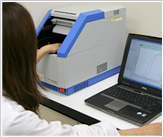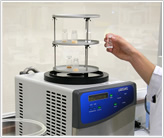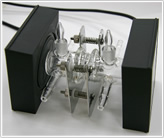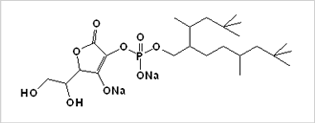Basic research
Development of new active ingredient
People's demand for effectiveness and utility increases each day, therefore it is essential for products to introduce latest technology. Thus Fundamental Research Division develops innovative technology for phenomena occurred with advancing age and/or circumstances such as age spot, dull skin, wrinkle, and dry skin by cooperating with other companies and universities.
We succeeded developing novelty functional materials from our previous researches. Moreover, by biochemically analyzing those materials we are now able to offer an effective formula for anti-aging.
We continue developing new active ingredients to be able to offer new possibilities.

- RT-POR Apparatus
- There are some cases in the assessment of genetic-level that a small amount of gene sequences in vivo should specifically increase.
This apparatus (Polymerase Chain Reaction) is applied to above cases.

- Freeze dryer
- Freeze drying is a popular method in food industry. Since it dries samples on freeze condition, it enables to maintain vitamin C without changing its component. Moreover, by freeze drying, we receive the advantages of increase solubility and back to the original state by just adding water.

- Diffusion cell of percutaneous absorption test
- Assess metabolic and permeability of active ingredients to the skin by using 3-dimensional cultured skin model.
A novel amphiphilic vitamin C derivative Funcos C-IS
L-Ascorbic acid (vitamin C) is known to be a neutral bioactive agent, and its multifarious activities in many biological systems have been reported. For example, vitamin C increases enzyme activity acts as an inducer of the collagen pathway and scavenges free radicals as an antioxidant during oxidant stress. However, Vitamin C is less resistant to heat and oxidative conditions than other vitamins are, and is easily decomposed in cosmetics. To solve this problem, numerous stable derivatives of vitamin C have been developed.
Among these derivatives, L-ascorbic acid 2-phosphate sodium and magnesium salt are hydrophilic derivatives, and ascorbyl tetraisopalmitate was a lipophilic derivative. These are already available as an additive in commercial cosmetics. However, these derivatives have lower skin permeability and metabolism to vitamin C.
We developed a novel amphiphilic ascorbic derivative, Funcos C-IS, which exhibits satisfactory thermal stability. Funcos C-IS improved skin permeability superior to those of vitamin C, and is susceptible to enzymatic hydrolysis by phosphatase to produce VC. Thus, these finding indicated that Funcos C-IS may be effective pro-Vitamin C in skin care. In closing, we expected that Funcos C-IS with the characteristic properties is utilized in not only skin-care field but also make-up fields.

INCI: Disodium Isostearyl Ascorbyl Phosphate
| Relevant Patents | Japan/Patent No. 4190539 The USA/ Patent No.7282597 Korea/Patent No.10-0719777 Singapore/Patent No.125273 |
|---|---|
| Conference Presentation | 16th IFSCC Conference in Florence 24th IFSCC Congress in Osaka |

-
- About OEM/ODM cosmetics
- Introducing our OEM/ODM cosmetics
- Quality Control
- Strict quality control framework. Introducing our quaity control system.

